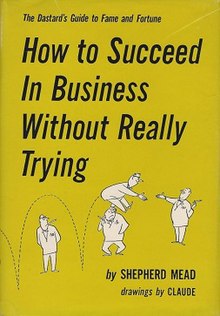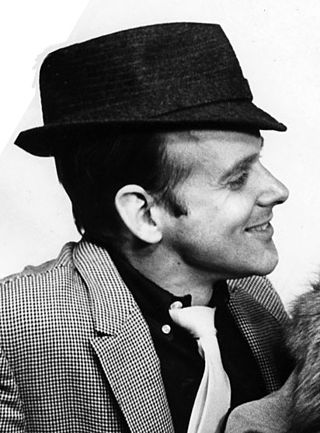
Robert Louis Fosse was an American actor, choreographer, dancer, and film and stage director. He directed and choreographed musical works on stage and screen, including the stage musicals The Pajama Game (1954), Damn Yankees (1955), How to Succeed in Business Without Really Trying (1961), Sweet Charity (1966), Pippin (1972), and Chicago (1975). He directed the films Sweet Charity (1969), Cabaret (1972), Lenny (1975), All That Jazz (1979), and Star 80 (1983).
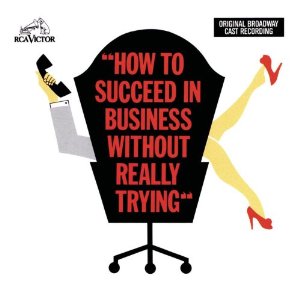
How to Succeed in Business Without Really Trying is a 1961 musical by Frank Loesser and book by Abe Burrows, Jack Weinstock, and Willie Gilbert, based on Shepherd Mead's 1952 book of the same name. The story concerns young, ambitious J. Pierrepont Finch, who, with the help of the book How to Succeed in Business Without Really Trying, rises from window washer to chairman of the board of the World Wide Wicket Company.
H2S is the chemical formula of hydrogen sulfide.

Robert Alan Morse was an American actor. Known for his performances on stage and screen, he received two Tony Awards, a Primetime Emmy Award and a Screen Actors Guild Award.
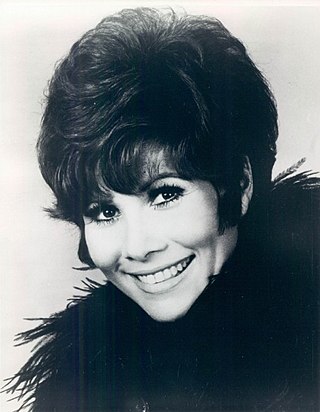
Michele Lee is an American actress, singer, dancer, producer, and director. She is known for her role as Karen Fairgate MacKenzie on the prime-time soap opera Knots Landing, for which she was nominated for a 1982 Emmy Award and won the Soap Opera Digest Award for Best Actress in 1988, 1991, and 1992. She was the only performer to appear in all 344 episodes of the series.
Roger Bart is an American actor and singer. He won a Tony Award and a Drama Desk Award for his performance as Snoopy in the 1999 revival of You're a Good Man, Charlie Brown.
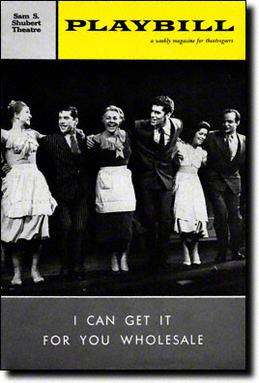
I Can Get It for You Wholesale is a musical, produced by David Merrick, music and lyrics by Harold Rome, and book by Jerome Weidman, based on his 1937 novel of the same title. It marked the Broadway debut of 19-year-old Barbra Streisand, who was nominated for the Tony Award for Best Performance by a Featured Actress in a Musical. The story is set in the New York City Garment District in 1937, during the Great Depression, and the songs utilize traditional Jewish harmonies evocative of the setting and the period of the show.

The Tony Award for Best Performance by a Leading Actor in a Musical is awarded to the actor who was voted as the best actor in a musical play, whether a new production or a revival. The award has been given since 1948, but the nominees who did not win have only been publicly announced since 1956.

Jonathan Freeman is an American actor and singer. He is known for voicing Jafar in Disney's Aladdin franchise, as well as the Kingdom Hearts franchise and the 2011 Aladdin musical.
Shepherd Mead, born Edward Mead was an American writer and is best known as the author of How to Succeed in Business Without Really Trying, which was adapted into a hit Broadway show and motion picture.
Benton & Bowles (B&B) was a New York–based advertising agency founded by William Benton and Chester Bowles in 1929. One of the oldest agencies in the United States, and frequently one of the 10 largest, it merged with D'Arcy-MacManus Masius in 1985, and continued business until a reorganization in 2002.
Anthony Scott Teague, also known as Scooter Teague, was an American actor and dancer.
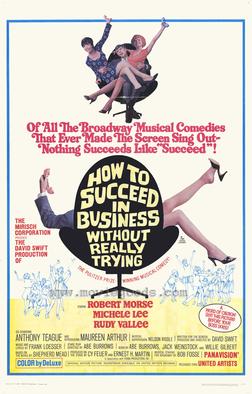
How to Succeed in Business Without Really Trying is a 1967 American romantic musical comedy-drama film based on the 1961 stage musical of the same name, which in turn was based on Shepherd Mead's 1952 book. The film was produced by United Artists and directed by David Swift, with original staging by Bob Fosse.
How to Succeed in Business Without Really Trying may refer to:
Christopher Jason Hanke, often credited as Christopher J. Hanke, is an American actor and singer known for his roles on Broadway and television.

How To Succeed With Women Without Really Trying: The Dastard's Guide To The Birds And Bees was a 1957 humor book by Shepherd Mead.
Ernest Harold Martin was an American Broadway producer who wrote the book for a musical, owned a Broadway theater and produced motion pictures, including Guys and Dolls, How to Succeed in Business Without Really Trying, A Chorus Line and Cabaret. Best known for such hits as Guys and Dolls, How to Succeed in Business Without Really Trying, and Cabaret, Martin left his mark on American and international theatre and screen.

Songs from How to Succeed in Business Without Really Trying is the first EP by Nick Jonas, released on May 8, 2012. The EP contains 5 songs which are available as a digital download on iTunes. The 5 songs on the EP are tunes that Nick performs on stage during the Broadway musical, How to Succeed in Business Without Really Trying.
"I Believe in You" is a 1961 song written by Frank Loesser for his musical How to Succeed in Business Without Really Trying, where it was introduced by Robert Morse. The protagonist of the musical, J. Pierrepont Finch, sings the song to himself in the mirror while shaving. In the movie version, Rosemary also sings it to Pierrepont.
How to Succeed in Business Without Really Trying: Soundtrack from the Musical Comedy is the cast album for the 50th anniversary Broadway revival of the 1961 musical How to Succeed in Business Without Really Trying, which had music and lyrics by Frank Loesser and book by Abe Burrows, Jack Weinstock, and Willie Gilbert, based on Shepherd Mead's 1952 book of the same name. Released digitally on May 31, 2011, and in physical formats on June 7 by Decca Broadway, the album featured performances of the musical numbers by the cast, headlined by Daniel Radcliffe and John Larroquette. It was nominated for Best Musical Theater Album at the 54th Annual Grammy Awards.
